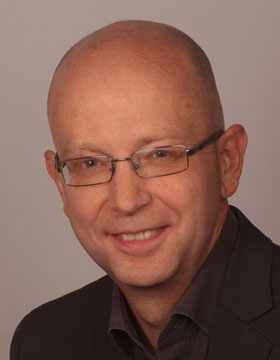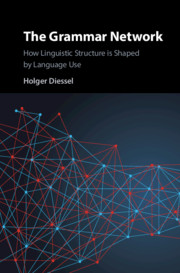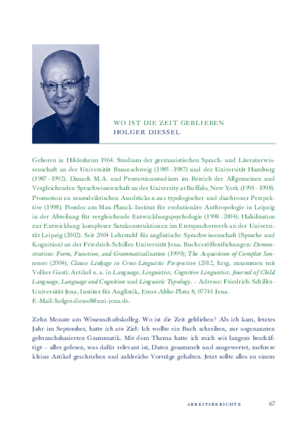
Holger Diessel, Ph.D.
Professor of English Linguistics
Friedrich-Schiller-Universität Jena
Born in 1964 in Hildesheim, Germany
Studied German Language and Literature at the University of Hamburg and Linguistics at the University of Buffalo
Schwerpunkt
Die Ursprünge von Sprache in Biologie, Kultur und GesellschaftArbeitsvorhaben
Usage-Based Grammar
Since the beginning of the 20th century, it has been a standard assumption of linguistic research that the study of the linguistic system needs to be separated from the study of language use. In the structuralist and generative paradigm, language, notably grammar, is seen as a self-contained system that includes discrete categories and combinatorial rules that are independent of usage. However, this view of grammar has been called into question by a new line of research that has become known as the usage-based approach. In this new approach, grammar is seen as a dynamic system consisting of emergent categories and fluid constraints that are in principle always changing under the pressure of general cognitive mechanisms involved in language use (i.e., communication and the processing of linguistic information). Challenging the structuralist dictum that the (synchronic) study of the language system must be separated from the study of language development, usage-based linguists take an evolutionary approach in which linguistic structure is generally analyzed in light of its development - in language history, language acquisition, and language evolution.Research relevant to the usage-based approach has appeared in various quarters of the language sciences, e.g. in functional and cognitive linguistics, linguistic typology, psychology, philosophy, and computer science. However, as it stands, the various strands of research are only loosely connected. As a Wiko Fellow, I will work on a project that seeks to integrate the various strands of usage-based research into a (more) unified approach. The project will be organized around two general themes. First, it will be concerned with the various cognitive mechanisms that cognitive linguists and psychologists have proposed to explain how linguistic structure is shaped by communication and processing; and second, it will be concerned with the nature of emergent categories and the dynamics of the linguistic system (i.e., the evolution of grammar). Combining evidence from synchronic and diachronic corpus studies, the project will elaborate some central hypotheses about the relationship between usage, structure, and development and the underlying cognitive mechanisms of grammar evolution.
Recommended Reading
Diessel, Holger. The Acquisition of Complex Sentences. Cambridge: Cambridge University Press, 2004.
-. Demonstratives: Form, Function, and Grammaticalization. Amsterdam: John Benjamins, 1999.
-. "Frequency Effects in Language Acquisition, Language Use, and Diachronic Change." New Ideas in Psychology 25 (2007): 108-127.
Kolloquium, 03.11.2015
Die Entstehung von sprachlichen Strukturen: Aspekte einer dynamischen, gebrauchs-basierten Grammatiktheorie
In der linguistischen und sprachphilosophischen Forschung gibt es eine lange Tradition, Sprache, insbesondere Grammatik, ohne jede Berücksichtigung von Aspekten des Sprachgebrauchs und der Sprachentwicklung zu analysieren. Diese Tradition spiegelt sich in Chomskys Trennung von Competence und Performance und in Saussures Unterscheidung von Langue und Parole, die die sprachwissenschaftliche Forschung viele Jahrzehnte beeinflusst haben. In der Chomskyschen Theorie ist Grammatik ein in sich geschlossenes System, das aus diskreten Kategorien und Regeln besteht, die letztendlich auf besonderen sprachlichen Fähigkeiten des menschlichen Verstandes beruhen.
In den letzten Jahren wurde dieser Ansatz jedoch von verschiedenen Seiten in Frage gestellt und es wurde argumentiert, dass die Entwicklung und Organisation sprachlicher Strukturen in grundlegender Weise durch Aspekte der Kommunikation, Konzeptualisierung und Prozessierung beeinflusst werden. In diesen Arbeiten wird Grammatik zumeist als ein dynamisches System charakterisiert, in dem sich linguistische Kategorien und Regeln permanent unter dem Einfluss von allgemeinen kognitiven Prozessen des Sprachgebrauchs verändern.
In diesem Vortrag werde ich die zentralen Annahmen der dynamischen Grammatiktheorie beschreiben und die Implikationen dieser Theorie für die Forschung zur Sprachevolution erläutern. Die aktuelle Forschung zum Sprachwandel und zur Sprachtypologie hat gezeigt, dass sich die Entstehung von grammatischen Kategorien (z.B. Hilfsverben), morphologischen Paradigmen (z.B. Kasusflexion) und Wortstellungsphänomenon (z.B. sprachübergreifende Korrelationen zwischen der Abfolge grammatischer Kategorien) auf der Grundlage von allgemeinen kognitiven Prozessen wie zum Beispiel der Kategorisierung, Automatisierung und Analogie erklären lassen, die nicht nur den Gebrauch von Sprache, sondern auch andere kognitive Phänomene beeinflussen (z.B. die Verarbeitung von visuellen Reizen). Unter Bezug auf diese Forschung haben einige Sprach- und Kognitionswissenschaftler die Hypothese aufgestellt, dass die Entstehung der Grammatik im Verlauf der Sprachevolution im Prinzip auf den gleichen kognitiven Mechanismen beruht wie die Entwicklung von sprachlichen Strukturen im Sprachwandel. Die dynamische Grammatiktheorie stellt Chomskys Hypothese, dass Grammatik auf angeborenem sprachlichen Wissen beruht, in Frage und lässt grammatische Kategorien und Regeln in einem völlig neuen Licht erscheinen.
Publikationen aus der Fellowbibliothek
Diessel, Holger (Cambridge, 2019)
The grammar network : how linguistic structure is shaped by language use
Diessel, Holger (Oxford, 2017)
Diessel, Holger (Berlin, Washington, DC, 2017)
Entrenchment in construction grammar
Diessel, Holger (Oxford, 2016)
Diessel, Holger (Berlin, 2016)
Frequency and lexical specificity in grammar : a critical review
Diessel, Holger (Cambridge [u.a.], 2009)
The acquisition of complex sentences Cambridge studies in linguistics ; 105
Diessel, Holger (2006)
Demonstratives, joint attention, and the emergence of grammar
Diessel, Holger (Amsterdam [u.a.], 1999)
Demonstratives : form, function and grammaticalization Demonstratives in crosslinguistic and diachronic perspective
Diessel, Holger ()
Im Kolleg entstanden 15.08.19
Köpfe und Ideen 2016
Wie kommt die Welt in den Kopf? Und wie kommt sie wieder heraus?
ein Porträt von Luc Steels, Dorit Bar-On, Holger Diessel, Peter Gärdenfors von Manuela Lenzen


